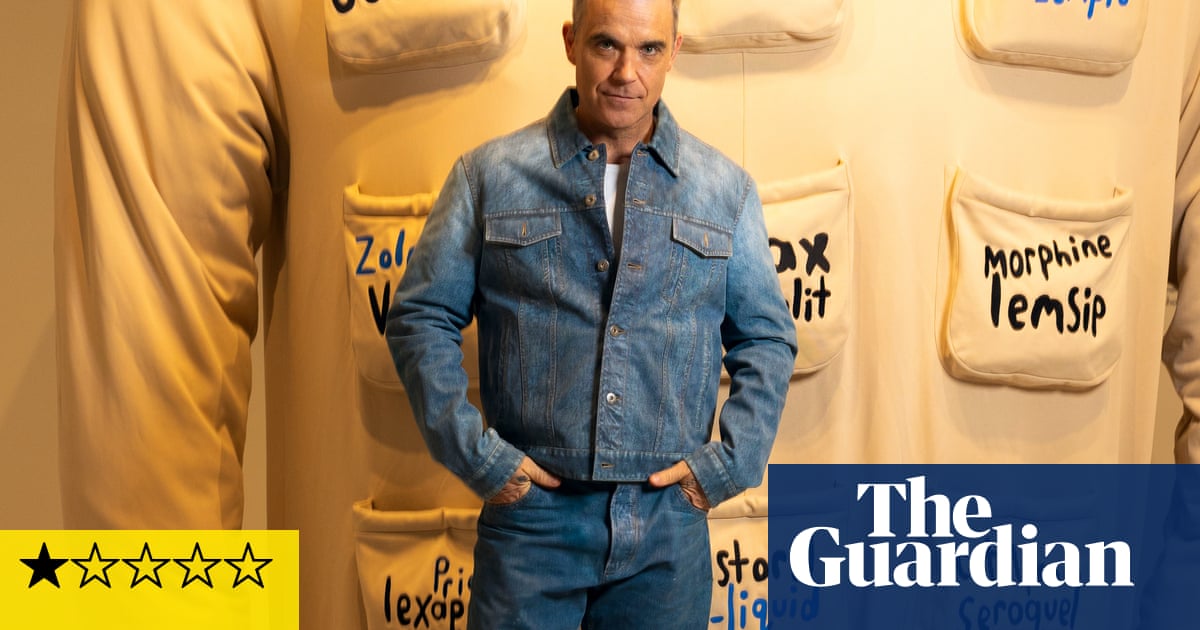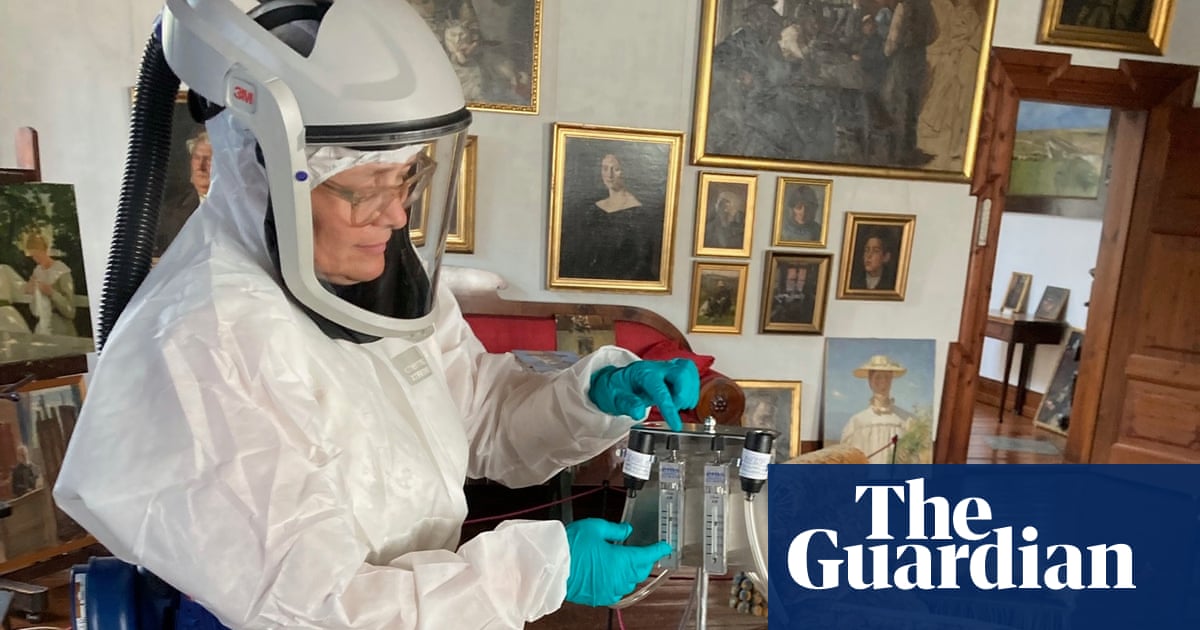The sign in the church reads simply: “God is real.” Well, they would say that, wouldn’t they, being a church. But it’s not a determined vicar who has put the poster up in a bid to convince his congregation. Rather it’s 22-year-old Cameron Winter, frontman of New York rock band Geese and now solo artist behind one of the year’s most beguiling albums.
Winter is in church – St Matthias in north London – for his first ever UK solo show. And while it may or may not convince you of God’s existence, it certainly feels like an encounter with the divine. Hunched over a piano, his hands run up and down the keys freely as he pours out his stream-of-consciousness lyrics in a voice that has to be heard to be believed – fragile and prone to cracking yet also powerful, soulful, almost supernatural. Who is this creature, you wonder.
I meet Winter at his record label offices the following morning. Tall with long hair that falls over his eyes, he might appear taciturn or awkward at first. But it doesn’t take long to realise that he has a wonderfully dry sense of humour. When I tell him I didn’t realise it was going to be just him and a piano – the album features guitar, the odd bit of percussion and an array of peculiar noises – he replies: “Yeah, well I was supposed to be playing with a 10-piece band but they didn’t show.”
Heavy Metal is an album as intriguing as its creator. It boasts vivid lyrics (“Cancer of the 80s / I was beat by ukuleles”), amorphous arrangements and, thanks to the single Love Takes Miles, a bona fide pop banger. It’s been compared to works by Bob Dylan, Leonard Cohen and Tom Waits, although for me it shares its greatest affinity with another canonical classic: Van Morrison’s Astral Weeks. Not so much in its sound as in the sense of a young man, wise beyond his years, attempting to reach some kind of other-worldly transcendence through music. During his set in St Matthias church, Winter is not shy about referencing God, Jesus and the Lord in his music – and at the end of the song $0 he breaks out into the passage that inspired his posters: “God is real, God is real, I’m not kidding, God is actually real … I’m not kidding this time, I think God is actually real.”
What, exactly, does he mean by that? There is a long pause, so long that I wonder if Winter is actually going to answer my question. Then, after almost a full minute, he says: “Just … the big guy deserves a shout out every once in a while, you know?” Would he call himself religious? Another long pause. As an interviewer you’re trained to wait these out, to let your subject feel the need to fill such awkward silences. But it turns out Winter really doesn’t mind awkward silences. Eventually, after twiddling his hands together for a couple of eternities, he says: “Yeah, it seems like it?”
It’s difficult to read whether or not Winter is being deadly serious. The backstory he gives around Heavy Metal certainly sounds like a flight of fantasy: according to him it was recorded in a series of Guitar Centers around his native New York with contributions from a five-year-old bassist while he partook of recreational blood-thinning medication. “Don’t we all like thin blood when it’s not a week night?” he says today, although even he struggles not to crack a smile at this.
Why, I ask, did he feel the need to invent tall tales like having a child bassist? “No, listen!” he says, suddenly quite animated. “There’s this musician friend I have whose nieces and nephews all play instruments from a really young age. One day he brought his nephew along and we were like, it’d be cute if he could pick up this giant bass that was way too big for him. We showed him what to play and then he just did it! He ended up replacing a bunch of the bass that we had on the record.”

Prior to music, Winter says he wanted to be an ice hockey player. His parents would drive him out to Long Island for games but they soon became alarmed at the amount of head injuries he was receiving. After one particularly bad concussion they pulled him out of the team. “That really bummed me out,” he says. But looking back, it may have been the moment his obsessional nature switched towards music.
Winter was only in his early teens when he formed Geese with school friends in 2016. Their second album, Projector, caused a buzz with its spiky post-punk stylings, but by its followup, 2023’s 3D Country, they had already moved on. A psychedelic, country-tinged take on Led Zeppelin with elements of math rock, 3D Country was nobody’s idea of a band being musically restrained. Yet Winter still craved the pure freedom of going solo. “I don’t even really go on stage with a setlist. I’m free as a bird.”
This freedom is evident in his lyrics, which are full of Joycean wordplay and Beat generation streams of consciousness, although he’s not sure that’s the right term. “My usual stream of consciousness is, ‘I have to pee. I’ve got to go put gas in my car.’ That’s not much to write about. So the hard part is to get your consciousness to the point where the stream is interesting.”

When we last heard Geese, Winter had adapted his vocals into a histrionic take on Robert Plant. His solo stuff sounds like someone entirely different. Critics have noted a similarity to Rufus Wainwright (and I’d throw Micah P Hinson and Devendra Banhart into the mix) – although, really, it doesn’t sound like anybody else. Had the band heard him sing this way before?
“They’ve heard me sing every possible way,” he says with a smile. “They stopped raising their eyebrows a long time ago.” Is this his natural voice? “The sick part is it does feel like my natural voice. This album is actually me trying to sing more normally. And then the first review said something like, ‘Cameron makes his weird voice even more disturbing and strange.’ I was like, ‘Damn it!’”
When Winter first played Heavy Metal to friends, the reaction was muted. “It’s not their fault,” he shrugs. “I don’t think they expected my solo album to sound like that. They thought it would be like my band only slightly less good, like most solo records are.” Even Winter’s father – a composer himself for TV and movies – tried to temper expectations. “It wasn’t that he disliked it, he was just, like, ‘Do whatever you want. But you may find out why most people don’t just do whatever they want.’”
And yet doing what he wanted turned out to be a pretty good idea. Rave reviews, a profile in the New York Times and a performance on Jimmy Kimmel Live all followed. Did it feel like he’d proved everyone wrong? “I thought it would be like that but it’s not really. I mean, I believed people when they said the record wasn’t going to do well. So the fact it has, that’s great, but it doesn’t make me feel like doing much of a victory lap or anything.”
Winter has spoken before about the strange sense of deflation that accompanies success. Suddenly he’s doing what he’s always dreamed of … so why doesn’t it feel as good as he imagined? “Yeah, well, you know, I gotta get over that shit,” he says. “It’s like, boo-hoo.”

Yet disillusionment does seem to be a reason why fans have connected with the record. While the lyrics can be cryptic, they seem to convey a very modern sense of dissatisfaction with the world. When I suggest this, Winter falls silent again. It feels as if seasons change and entire new species evolve before he is finally ready to respond. “I mean, who the hell is satisfied with the world?” he says. “Saying the world is dissatisfying is like writing a song called Donuts Taste Good.”
He prefers to think of his songs as more multilayered than that, which is understandable. Heavy Metal is frequently funny, surreal and uplifting as well as prone to melancholy. Still, it’s hardly what you’d call an upbeat record. He agrees: “There are some people who can make good songs out of being happy and they put them in Despicable Me and stuff like that, you know?” he says. “I was tapped up for that too but I couldn’t get an idea going.” (He’s joking … I think).
When he is done promoting Heavy Metal, Winter will return to Geese. They have a new album, which he says will be “out next Winter Olympics”. It’s likely to be another stylistic shift. One thing he has noticed is how different audiences have been on these solo dates compared with when Geese visited the UK. “There’s a lot less nitrous oxide left in the parking lot,” he says. “And a lot more reverence than I was expecting. I normally try and make people laugh or do something silly with the piano to break that.”
At the St Matthias gig, that involved changing the word “dollar” to “quid”. “Yeah, that broke them,” he smiles.
What he really enjoys from an audience, though, is confusion; a sense that they have no idea how to react. When he sings the “God is real” passage live, he says a lot of people who have not heard it before start laughing. “They think I’ve gone crazy or I’m on drugs or something.” But other people will close their eyes in rapture or start crying. “It feels very good to have a song that can elicit such a huge range of emotions,” he says. You might even call it a religious experience.

 3 hours ago
7
3 hours ago
7













































